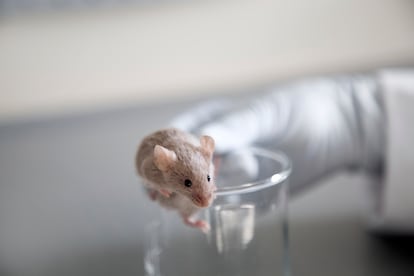Fewer calories, longer life, but with nuances: The complex relationship between fasting and longevity
An analysis of 1,000 genetically diverse mice on different types of calorie-restricted diets and intermittent fasting shows that the potential benefits of these strategies are more complex than previously thought

Eating fewer calories can lead to a longer life. This idea has been repeated insistently in recent times, but the reality could be much more complex than previously thought and genetics may play a fundamental role. This is explained in a comprehensive study carried out on almost 1,000 genetically diverse mice that was published Wednesday in the scientific journal Nature. Although caloric restriction was shown to lengthen life in all rodents, the effects on their health were not always the same. The data provide nuances, details, and new knowledge about the complex relationship between dietary restriction and longevity.
“Calorie restriction first appeared to extend the lifespan of rodents in the 1930s,” says Gary Churchill, a geneticist at Jackson Laboratory in Maine and senior author on the paper along with biologist Andrea di Francesco, in a telephone conversation. Since then, calorie restriction has also been shown to prolong the lifespan of many other species, from worms to macaques (albeit modestly), becoming the holy grail of eternal youth. But behind the headlines came nuances. “In the early 2010s, it began to become clear that not all genetic backgrounds benefit equally from this restriction,” Churchill continues. That’s when he began to devise the study that has now come to light.
The investigation wanted to test how much genetics could influence outcomes, so the researchers put 960 genetically diverse female mice through five different interventions. Some were given a normal diet; others a 20% reduction in caloric intake; and the last, up to 40%. Two groups of mice were put on an intermittent fasting diet, in which the mice went without food for one or two consecutive days per week. The authors then collected data from about 200 assessments of immune, blood, metabolic, functional, and behavioral traits. And then they crossed them over.
They found that “dietary restriction increased the life expectancy of mice overall,” even in those on the strictest regime with their normal diet cut by 40%, which surprised the researchers. “It’s extreme restriction. But there was no indication that anything was wrong, other than the mice were smaller than normal.” The researchers also found that the effects of calorie restriction on life expectancy were different not only depending on the type of diet followed, but also on age, genetic ancestry, and even the resistance of the mouse to its new situation.
Dieting and not losing weight can be frustrating for millions of humans, but in the case of mice, it was shown to be linked to a greater increase in lifespan. “The animals that were able to keep their body fat and glucose levels up lived longer. And my assumption here is that these animals have an intrinsic resilience,” Churchill explains. “These interventions are stressful and the animals that are losing weight are showing you that they respond negatively to dieting. In this sense, diets simply reveal something about the nature of the animal.”
Another case where more fat seemed to have a protective effect was in older rodents. Many mammals, near the end of their life, begin to lose weight. Sometimes it is a sign that they have some form of disease, but it can also simply be a process of wear and tear, giving the impression of wasting away. This happens to humans as well. “And in mice,” says the geneticist, “a few weeks before they die, they begin to lose weight. The ability to maintain beyond-normal adiposity, at an advanced age, is an indicator that they are still healthy.”
We tend to intuitively think that a strict diet can increase life expectancy, primarily by improving cardiovascular health. But it is a more complex process. In the study, the researchers found that “reductions in body fat and blood sugar levels were not necessarily correlated with longer life expectancy.” In other words, it is not that the mice lived longer because they did not have problems related to being overweight. There was something else that escaped the analysis. “There are some good hypotheses about this,” Churchill reflects. “For example, limiting calories changes the internal functioning of a cell, increasing cellular recycling and autophagy.” This term, which literally means “eating oneself,” is used to explain the process by which cells burn their unnecessary or damaged components to produce energy. This would serve to cleanse our body at a cellular level. There is a lot of scientific literature that suggests that autophagy could extend life expectancy.
This is not the case with this analysis. “We may suspect it, but we did not do studies at the molecular level,” Churchill explains. The specialist is cautious about transferring his results with mice to the medical environment. “At the moment, the studies that have been carried out in humans on calorie restriction and intermittent fasting focus on metabolic effects. These are important, but I don’t think that in the short term we will see evidence that these diets extend people’s life expectancy,” he explains. A meta-analysis of the pre-existing scientific literature, published in 2021 by the journal Science, highlighted that despite the number of studies in animals, “it is not possible to determine whether calorie restriction diets affect the biological ageing of people.”
Marina García Macía, a biologist at the Biomedical Research Institute of Salamanca in Spain, is positive about the present analysis, which she did not participate in. She considers it to be “an in-depth study” with some “novel” conclusions. García Macía values the large number of rodents used and the fact that they are female. The National Institutes of Health (NIH) in the United States began to recommend a decade ago that there should be parity in the sex of mice used in experiments, since these tended to be male in percentages that in some fields (such as the study of pain) stood at around 80%.
The results of this study are numerous, sometimes slightly contradictory, and sometimes counterintuitive. In any case, they concur with previous scientific literature but they qualify and remove some of the wind from the sails of mantras that have been repeated for years. It may be that dietary restrictions have a clear relationship with life expectancy. But this relationship is more complex than previously thought.
Sign up for our weekly newsletter to get more English-language news coverage from EL PAÍS USA Edition
Tu suscripción se está usando en otro dispositivo
¿Quieres añadir otro usuario a tu suscripción?
Si continúas leyendo en este dispositivo, no se podrá leer en el otro.
FlechaTu suscripción se está usando en otro dispositivo y solo puedes acceder a EL PAÍS desde un dispositivo a la vez.
Si quieres compartir tu cuenta, cambia tu suscripción a la modalidad Premium, así podrás añadir otro usuario. Cada uno accederá con su propia cuenta de email, lo que os permitirá personalizar vuestra experiencia en EL PAÍS.
¿Tienes una suscripción de empresa? Accede aquí para contratar más cuentas.
En el caso de no saber quién está usando tu cuenta, te recomendamos cambiar tu contraseña aquí.
Si decides continuar compartiendo tu cuenta, este mensaje se mostrará en tu dispositivo y en el de la otra persona que está usando tu cuenta de forma indefinida, afectando a tu experiencia de lectura. Puedes consultar aquí los términos y condiciones de la suscripción digital.









































